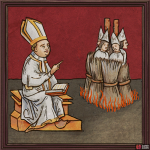Text
The Inquisition (from Latin inquisitio - to search, to inquire) was founded in the 12th century as a response to the massive heretical movement of the Albigensians (Cathars). Originally it was intended to serve more as a tool to punish and direct the clergy, but later its main mission became the fight against all the heretics. It was directly subordinate to the Pope, and thus became more or less an independent power.
The Inquisition had three main tasks - to search for heretics; to interrogate them and convict or bring them to repentance; and to refer the unrepentant to the secular authorities for punishment.
The incoming inquisitor first reported to the local bishop and then had a solemn mass and sermon celebrated. He then received reports (denunciations) of heresy from the local people. Heretics were given a so-called period of mercy in which they could declare themselves and ask for forgiveness. The inquisitor evaluated the reasonings and began his own process, which was more intended to confirm the accusations, rather than objectively examine them.
Although in the common consciousness, the Inquisition is mainly associated with cruel practices, fanatical actions, and a great fear of inquisitors, one of the intended purposes of the Inquisition and its operation, was to rationalize and legalize the trial of heretics and to suppress the practice of ordeals - the godly trials.
The Inquisition process was therefore based primarily on the testimony and interrogation of the accused. The accused, however, had almost no rights and could be subjected to torture. The Inquisitorial trial was conducted in secret, but the proceedings were recorded in writing for the needs of the Inquisition. These records were intended to prevent manipulation of testimonies.


No Comments